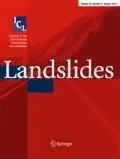I am honored by the invitation to write this foreword for the Journal of the International Consortium on Landslides on the occasion of International Mountain Day 2018. The Food and Agriculture Organization of the United Nations (FAO), where I work, has been an active partner in the International Consortium on Landslides (ICL) since it was established in 2002. This has included hosting the second World Landslide Forum in 2011 at FAO’s Rome headquarters.
Natural disasters including landslides have, over the past decade, caused some USD 1.3 trillion in damage and affected 2.7 billion people. Mountain areas are particularly susceptible to natural disasters that worsen/intensify an already critical situation in which one out of three mountain people in developing countries is at risk of food insecurity. The impact of disasters on agriculture has direct effects on agro-ecosystem resources, food security and nutrition while undermining national development gains that have taken years to build. Finally, disasters have immediate effects on lives and livelihoods, as well as on natural resources and built environment.
Given these profound and widespread impacts, FAO is committed to increasing the resilience of people and ecosystems to better withstand such threats and crises, including those related to climate change. This is a natural fit, for FAO is the United Nations agency with a mandate to work globally on all aspects of food and agriculture (including fisheries, forestry, and natural resource management) as well as food security and nutrition.
Building resilience to cope with protracted crises, disasters, and conflicts is one of the most important challenges to achieve food security and improve rural livelihoods globally. It is also an essential and powerful means towards achieving the Sustainable Development Goals (SDGs), and their promise to leave no one behind. Our work in FAO’s Forestry Department, which I lead, makes a particular contribution towards achieving SDG 6 on Clean Water and Sanitation by protecting and restoring water-related ecosystems in mountains and watersheds. We also contribute to achieve SDG 17 concerning Partnerships for the Goals, as FAO is host to the Secretariat of the Working Party on the Management of Mountain Watersheds and the Secretariat of the Mountain Partnership, among others.
FAO’s work on strengthening resilience focuses on supporting member countries as they adopt and implement legal, policy, and institutional frameworks for risk reduction and disaster management. We assist countries as they learn to make use of regular information as well as early warnings against threats, in order to reduce the risks and vulnerabilities of households and communities, and to become prepared for and manage effective responses to disasters. This support is provided through field interventions as well as normative and standard-setting work. It also contributes to several SDGs, such as ending poverty and hunger, improving health, making human settlements more resilient, and protecting life on land.
More specifically, FAO has provided emergency assistance to countries affected by landslide events, such as building community-based resilience to landslides in Nepal and establishing early warning systems there; and implementing a safety net intervention program to support households affected by flooding and landslides in Rwanda. FAO’s Forestry Department is leading our agency’s work on building resilient watersheds and mountains with a new and increased focus on disaster risk reduction, adaptation to climate change, a coalition for fragile ecosystems, and closer links with urban issues.
We also host the Secretariat of the Mountain Partnership (MP), a UN alliance of 340 members (governments, international agencies, and civil society organizations) with a specific mandate to promote sustainable mountain development. In fact, 1 year ago, Partnership members endorsed a Framework for Action for implementing the 2030 Agenda for Mountains as an explicit link between its work and the UN 2030 Agenda for Sustainable Development.
In keeping with this work, the hashtag #MountainsMatter is the theme that was chosen for this year’s celebration of International Mountain Day on 11 December, an occasion to remind the world that the current neglect of mountains and mountain people must stop. It is also a good occasion to remind them of the crucial role that mountains play in providing key ecosystem goods and services to the planet and their vulnerability in the face of climate change. It is also a great occasion to remind everyone that we must all step up and help to raise public awareness of mountains and their value.
In this regard, the Journal of the International Consortium on Landslides provides a respected international platform for sharing scientific and technical knowledge on landslides and natural hazards, and greatly contributes to raising the awareness that mountains matter for disaster-risk reduction and protecting livelihoods.
Our longstanding collaboration with ICL has been very fruitful and I am very pleased to confirm that FAO will be an official partner of ICL in organizing the fifth World Landslide Forum in November 2020 in Kyoto, Japan, a milestone event on disaster-risk reduction. We commend ICL for bringing the international community together on this very important topic. FAO is fully engaged in continuing and strengthening our relationship with ICL to increase the resilience of communities to disaster and to promote disaster-risk management at all levels, in alignment with FAO’s Strategic Framework and the Sendai Framework for Disaster Risk Reduction 2015–2030, and in support of the Agenda 2030 for Sustainable Development.

Hiroto Mitsugi
Assistant Director-General
FAO Forestry Department
Author information
Authors and Affiliations
Corresponding author
Rights and permissions
About this article
Cite this article
Mitsugi, H. Foreword by Hiroto Mitsugi for the Journal of the International Consortium on Landslides. Landslides 15, 2323–2324 (2018). https://doi.org/10.1007/s10346-018-1076-z
Received:
Accepted:
Published:
Issue Date:
DOI: https://doi.org/10.1007/s10346-018-1076-z

